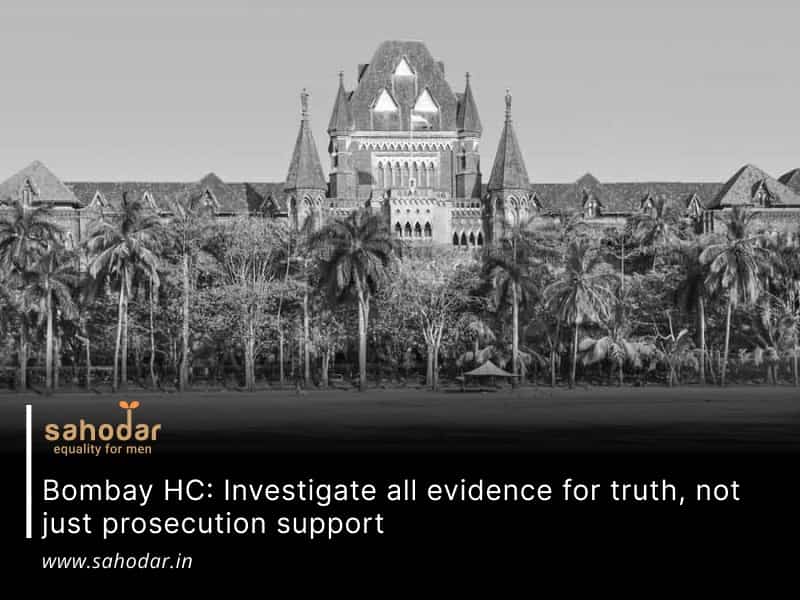A bench led by Justice Vinay Joshi ordered an investigating officer to consider the evidence produced by the accused booked in case under Sections 498A and 306 of the IPC after his wife died by suicide.
In a recent case, Nikhil Ashokrao Waghmare vs State of Maharashtra, the Bombay High Court underscored the paramount obligation of an investigating officer to ascertain the veracity of a matter. The court emphasized that the officer’s duty encompasses a comprehensive examination and collection of all evidentiary material pertinent to the case, rather than confining attention solely to evidence favorable to the prosecution. The court further referenced Section 2(h) of the Code of Criminal Procedure (CrPC), which defines the term ‘investigation,’ and elucidated that the CrPC does not prescribe a mandate for investigating officers to exclusively rely on evidence supportive of the prosecution’s stance.
“The statute no where says that collection of evidence shall be in support of the case of the prosecution. No doubt, the investigating officer shall be given complete and full freedom to carry the investigation in accordance with law. The material which is sought to be produced by the accused may or may not help the investigating agency, but, it is totally unacceptable that he shall not look into the same,” the bench observed.
The bench affirmed that they were unaware of any legal provision that prohibits the investigating officer from examining material they deem pertinent and significant for uncovering the truth.
“Since the fair investigation and discovery of truth is the ultimate object, the investigating officer has to unearth the truth and bring the real facts on record. It is a requirement of fair trial that there is fair investigation, and there can be no fair investigation if the investigating officer does not take into consideration all relevant material which is desirable for the purpose of investigation,” the bench said in its October 18 order.
Certainly, here’s a legal-formulation of the provided paragraphs:
The Court underscored the imperative that the Code of Criminal Procedure (CrPC) does not countenance unilateral investigative efforts solely designed to amass evidence supportive of the prosecution’s case.
This pronouncement transpired during the adjudication of an application tendered by an accused party, beseeching the Court to issue a directive mandating the investigating officer’s consideration of the WhatsApp correspondence of the deceased spouse.
In the context of the case, the accused’s wife met a tragic demise by suicide in February 2022, a mere three months subsequent to their matrimonial union. Subsequently, the applicant and his family faced allegations invoking Section 498A (cruelty) and Section 306 (abetment to suicide) of the Indian Penal Code (IPC).
In August 2023, the applicant proffered the police with WhatsApp communications of the deceased, contending that they would afford a ‘lucid perspective’ on the factual milieu. The applicant asserted that these communications would substantiate the absence of a ‘prima facie’ case against him and his family. Regrettably, the investigating officer declined to consider this evidentiary material.
The applicant maintained that the subject communications bore a pivotal character, furnishing the investigating officer with substantial assistance in the quest for an equitable determination.
In response to these contentions, the Court reiterated the foundational objective of the criminal justice system, namely, the ascertainment of the veritable truth. Additionally, the Court reaffirmed the elemental doctrine of criminal jurisprudence, according to which the presumption of the accused’s innocence prevails until guilt is established through the requisite standard of evidence.
“Fair, impartial and transparent criminal investigation is sine qua non for ensuring fair trial for the accused. The process of fair investigation and fair trial are as much necessary for the victim, as it is also equally necessary for the accused. The investigating officer is, therefore, under an obligation to carry fair investigation with a sole moto to reach to the truth,” the bench underscored.
Based on these insights, the court concluded the case by instructing the investigating officer to factor in the WhatsApp conversations of the deceased.
“However, it is left to the discretion and wisdom of the investigating officer to rely or not to rely on the said documents produced by applicants. Needless to say that we hope and expect that the investigating officer shall carry the investigation in a fair manner,” the Court said.

